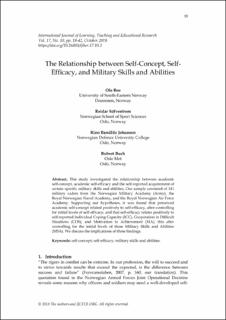| dc.contributor.author | Boe, Ole | |
| dc.contributor.author | Säfvenbom, Reidar | |
| dc.contributor.author | Johansen, Rino Bandlitz | |
| dc.contributor.author | Buch, Robert | |
| dc.date.accessioned | 2021-01-14T11:51:27Z | |
| dc.date.available | 2021-01-14T11:51:27Z | |
| dc.date.created | 2018-10-04T11:58:46Z | |
| dc.date.issued | 2018 | |
| dc.identifier.citation | International Journal of Learning, Teaching and Educational Research. 2018, 14 (10), 18-42. | |
| dc.identifier.issn | 1694-2116 | |
| dc.identifier.uri | https://hdl.handle.net/11250/2723034 | |
| dc.description.abstract | Abstract. This study investigated the relationship between academic self-concept, academic self-efficacy and the self-reported acquirement of certain specific military skills and abilities. Our sample consisted of 141 military cadets from the Norwegian Military Academy (Army), the Royal Norwegian Naval Academy, and the Royal Norwegian Air Force Academy. Supporting our hypotheses, it was found that perceived academic self-concept related positively to self-efficacy, after controlling for initial levels of self-efficacy, and that self-efficacy relates positively to self-reported Individual Coping Capacity (ICC), Cooperation in Difficult Situations (CDS), and Motivation to Achievement (MA), this after controlling for the initial levels of these Military Skills and Abilities (MSA). We discuss the implications of these findings. | |
| dc.language.iso | eng | |
| dc.title | The Relationships Between Self-Concept, Self-Efficacy, and Military Skills and Abilities | |
| dc.type | Peer reviewed | |
| dc.type | Journal article | |
| dc.description.version | publishedVersion | |
| dc.source.pagenumber | 18-42 | |
| dc.source.volume | 14 | |
| dc.source.journal | International Journal of Learning, Teaching and Educational Research | |
| dc.source.issue | 10 | |
| dc.identifier.doi | 10.26803/ijlter.17.10.2 | |
| dc.identifier.cristin | 1617847 | |
| cristin.unitcode | 1627,1,40,0 | |
| cristin.unitname | Forsvarets stabsskole | |
| cristin.ispublished | true | |
| cristin.fulltext | original | |
| cristin.qualitycode | 1 | |
